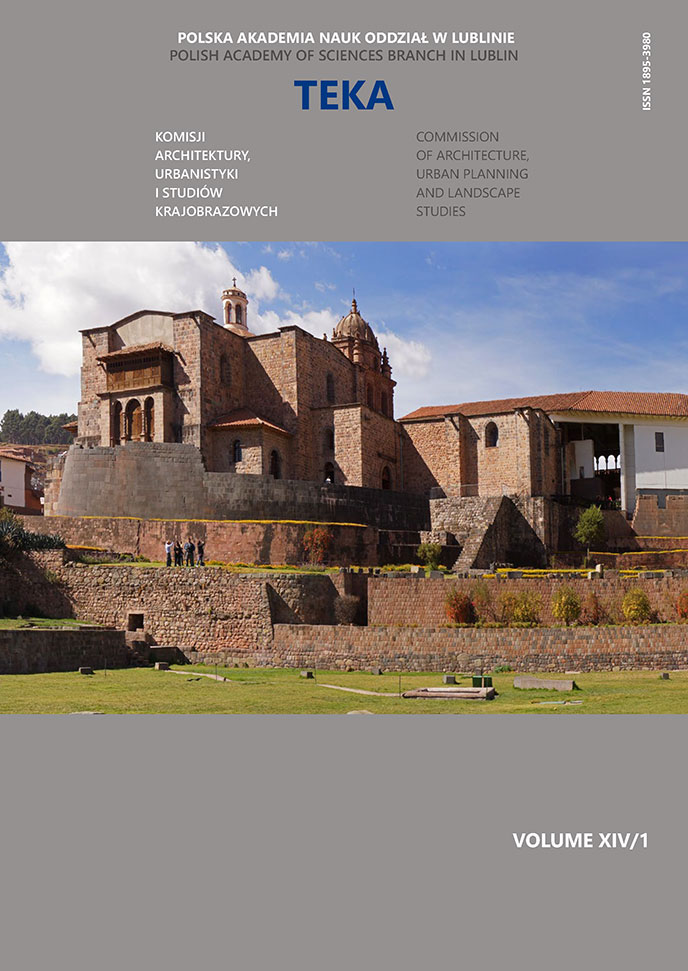Overview and classification of housing forms intended for older and disable people occurring in high developed countries in context to deficit of similar forms in Poland
Article Sidebar
Issue Vol. 14 No. 1 (2018)
-
Astronomical observations in the Inca Temple of Coricancha (Cusco)? A critical review of the hypothesis
Mariusz Ziółkowski, Jacek Kościuk7-33
-
Lighting policy as an integral part of sustainable urban planning
Agata Łopuszyńska, Magdalena Belof34-43
-
Optical properties of opaque and light-transmitting photovoltaic systems in architecture and their influence on architectural form
Marcin Brzezicki, Magdalena Muszyńska-Łanowy44-54
-
Built environment of the tall housing buildings in Poland
Dariusz Gawel55-62
-
Features of housing sanation in the historical architectural environment
Kateryna Danko, Kashchenko Tetyana63-70
-
Hypothetic Reconstruction of The Development of The Defensive Structures of The Middle Town of Rohatyn in 15th−17th Centuries
Mykola Bevz71-88
-
The modernization of public spaces in problematic residential areas exemplified on selected projects and realizations in the Bronowice district of Lublin
Kamila Boguszewska, Natalia Przesmycka89-97
-
Project of revitalisation of the area next to the Potocki family Palace in Lublin
Patryk Krupiński, Krystyna Pudelska98-106
-
Classroom training strategies to strengthen the hotbed of research in architecture
Rolando Arturo Cubillos González107-115
-
Effect of accessibility in housing complexes on shaping of beauty in the urban environment. Selected examples from Cracow
Karolina Dudzic-Gyurkovich116-125
-
Architecture in transition: the case study of the dormition catedral in Volodymyr Volynskyi
Petro Rychkov126-135
-
The earliest public green areas connected with Jelenia Góra, part. 1.
Marzanna Jagiełło, Wojciech Brzezowski136-144
-
Overview and classification of housing forms intended for older and disable people occurring in high developed countries in context to deficit of similar forms in Poland
Monika Magdziak145-155
Archives
-
Vol. 16 No. 4
2020-12-30 11
-
Vol. 16 No. 3
2020-09-30 10
-
Vol. 16 No. 2
2020-06-30 11
-
Vol. 16 No. 1
2020-03-31 10
-
Vol. 15 No. 4
2019-12-30 6
-
Vol. 15 No. 3
2019-10-31 9
-
Vol. 15 No. 2
2019-06-28 12
-
Vol. 15 No. 1
2019-03-29 13
-
Vol. 14 No. 3
2018-10-28 14
-
Vol. 14 No. 2
2018-06-29 14
-
Vol. 14 No. 1
2018-03-30 13
-
Vol. 13 No. 4
2017-12-29 8
-
Vol. 13 No. 3
2017-09-29 9
-
Vol. 13 No. 2
2017-06-30 10
-
Vol. 13 No. 1
2017-03-31 10
-
Vol. 12 No. 4
2016-12-30 12
-
Vol. 12 No. 3
2016-09-30 10
-
Vol. 12 No. 2
2016-06-30 9
-
Vol. 12 No. 1
2016-03-31 8
Main Article Content
DOI
Authors
Abstract
In most highly developed countries, in addition to services and home care system, there are various forms of housing with care and services for the elderly and the disabled. In this work, the author presents the effect of searching for various housing solutions in a brief description of residential forms. A classification of recognized housing models was prepared in the form of a summarizing table, in which groups of housing forms with similar characteristics were selected, and assigned to groups of residents with different level of disability and independence. In addition, the author systematizes the terminology in English-language publications and presents general conclusions from the conducted research in the context of a deficit of similar to the presented solutions in Poland.
Keywords:
References
Anderzhon J.W., Design for Aging: International Case Studies of Building and Program, John Wiley & Sons, 2012.
Brawley E.C., Design Innovations for Aging and Alzheimer’s, Creating Caring Environment, Wiley & Sons, 2006.
Christensen K., Encyclopedia of Community: From the Village to the Virtual World, Sage Publications, 2003. DOI: https://doi.org/10.4135/9781412952583
Evans S., Community and Aging, Maintaining quality of life In housing with care settings, The Policy Pres, 2009. DOI: https://doi.org/10.2307/j.ctt9qgwsj
Hughes D., Judd S., Design for Aging: International Case Studies of Building and Program, John Wiley & Sons, 2012.
Magdziak M., Housing forms of elderly people, PhD thesis, Lodz, 2014. (in Polish)
Perkins E., Building Type Basics for Senior Living, John Wiley & Sons, 2013.
Regulation of the Minister of Labor and Social Policy of 14 March 2012 in the matter of sheleterd housing, Dz. U. Of 22 March 2012. (in Polish)
Regulation of the Minister of Labor and Social Policy of October 17, 2001 on Family Care houses, Dz.U. No. 127 item 1399. (in Polish)
Robson D., Nicholson A., N. Barker, Homes for the Third Age: A Design Guide for Extra Care Sheltered Housing, Taylor & Francis, 1997.
Schwarz B., Brent R., Aging, Autonomy, and Architecture: Advances in Assisted Living, JHU Press, 1999. DOI: https://doi.org/10.56021/9780801860331
Social Welfare Act of 12 March 2004, Dz. U. No. 64, item 539. (in Polish)
Szweda-Lewandowska Z., Predictions of demand for places in social welfare homes for people aged 75 and over, [in:] Aging of the Polish population. Between demography and social gerontology, red. J.T. Kowalewska, P. Szukalski, Lodz 2008, p.138. (in Polish)
Wesołowska E., Running social care homes is unprofitable, Dziennik Gazeta Prawna, http://praca.gazetaprawna.pl (21.02.2012). (in Polish)
Yesalis C.E., U.S. Health Care: Principles and Perspectives, Cengage Learning, 2012.
Article Details
Abstract views: 230


